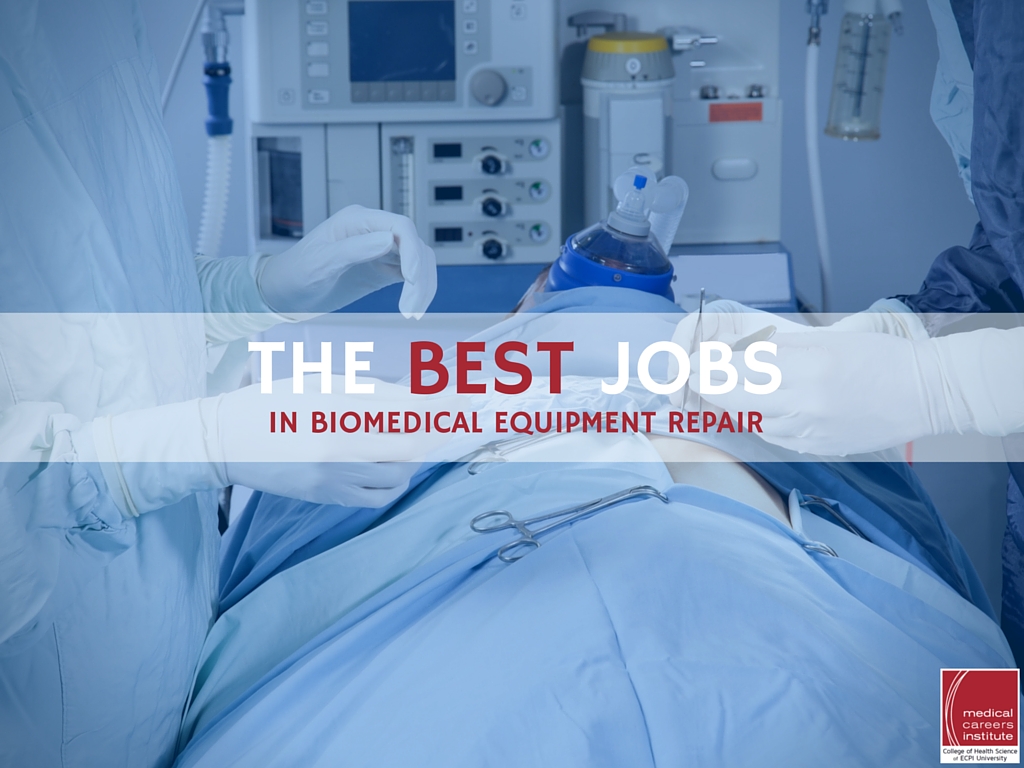
What Are the Best Jobs in Biomedical Equipment Repair?
When you're in a hospital and you hear the sounds of equipment monitoring patients, or see doctors using high-tech devices to perform life-saving operations, you may be seeing the results of the hard work of biomedical equipment technicians. A plethora of sophisticated new medical imaging tools has created a new job category for those aspiring to help medical personnel create successful outcomes for patients in hospitals and clinics.
CAT scanners, MRI machines, PET/CT devices, x-ray apparatus, and ultrasound equipment are just some of the advanced devices that need to be installed, inspected, maintained, and upgraded in order for medical workers to do their jobs.
Become the Bridge with Biomedical Equipment Repair
Biomedical equipment technicians (BMETs), also called biomedical engineers or biomeds for short, are crucial professionals filling the gap between medicine and technology to help doctors, nurses and other medical staff use:
- Surgical Robots
- Nuclear Imaging Devices
- Fluoroscopic Imaging Systems
- Patient Monitoring Instruments
- And many other complex appliances
These professionals use their technical expertise to advise hospitals, HMOs, and clinics about the purchase, maintenance, and installation of the latest machines from medical device manufacturers. It's an important role that has a profound impact on the health of patients.
Some BMETs are employed directly by hospitals, whereas others work at the wholesale or retail level for medical equipment supply houses. Most BMETs work full-time and may even be on-call on weekends or at night, especially if they're working with hospitals or wholesale companies. Some BMETs have variable schedules.
What Does Medical Equipment Repair Involve?
The job involves hands-on work with machines — calibrating, testing and reviewing results. Sometimes, parts may need to be replaced or upgrades to equipment may need to be performed. BMETs make use of computer software, hardware and hand tools to perform their work, occasionally standing for hours at a time or bending and crouching. The job can also involve record keeping and reviewing product manuals. Fixed deadlines can factor in, as well.
BMETs interact with medical staff and patients. They are expected to train doctors and nurses in the proper use and care of equipment, theories of operation, physiological principles and procedures for safe clinical operation. They may be called to speak with administration or facilities staff about different devices and adhering to standard medical guidelines.
Some of the equipment BMETs are expected to maintain and know about include:
- Surgical Lasers
- Electron Microscopes
- Gamma Cameras
- Picture Archiving and Communication systems (PACS)
- Respiratory Ventilators
- Dialysis Machines
- Film Processors
- and many other devices
Expertise with this equipment will allow a BMET to gain experience with a diverse array of medical practices, including:
- Radiography
- Mammography
- Nuclear Medicine
- Computed Tomography
- Optometry
- Anesthesia
- Physiological Monitoring
- Telemedicine
BMETs indirectly help patients recover from life-threatening ailments without having to be close to surgical procedures.
How to Become a Biomedical Repair Specialist
To become a BMET, there is a minimum requirement of at least an associate's in biomedical equipment technology or in a related field such as engineering or electronics. For some specializations and for advancement in the field a bachelor's degree may be necessary. Training to become a BMET involves learning aspects of electronics, mechanical engineering, human physiology and anatomy, electrical engineering and computer-aided design. Frequently, different manufacturers will offer training on specific devices, and continuing education and on-the-job learning is an aspect of being a BMET, with additional certifications possible allowing for greater income.
Halfway through my first term. Cant wait till the 3rd or 4th term to start studying my major. #ecpi #EET #CollegeLife
— Dustin Pulu (@XbCABOOSEdX) September 10, 2014
If you're interested starting on the path toward a biomedical equipment repair role, contact ECPI University today for more information about earning your Associate of Science degree in Electronics Engineering Technology with a concentration in Medical Imaging Equipment Technology in as little as 1.5 years. It could be the Best Decision You Ever Make!
DISCLAIMER – ECPI University makes no claim, warranty or guarantee as to actual employability or earning potential to current, past or future students or graduates of any educational program we offer. The ECPI University website is published for informational purposes only. Every effort is made to ensure the accuracy of information contained on the ECPI.edu domain; however, no warranty of accuracy is made. No contractual rights, either expressed or implied, are created by its content.
For more information about ECPI University or any of our programs click here: http://www.ecpi.edu/ or http://ow.ly/Ca1ya.


